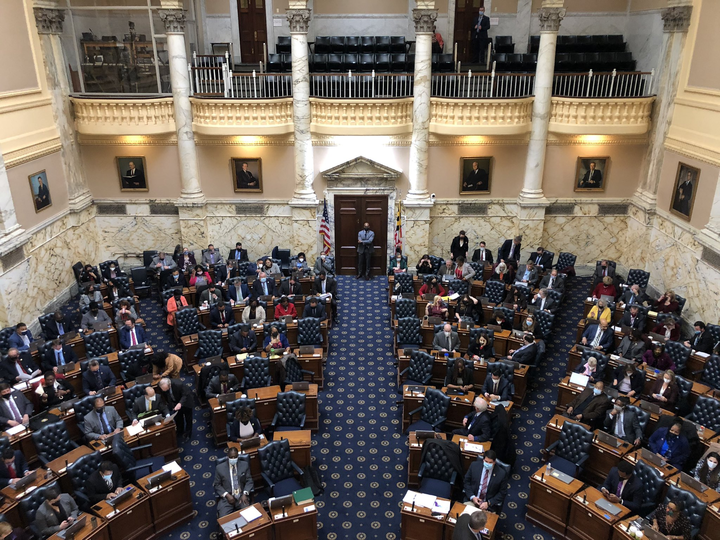ANNAPOLIS, Md. — The Maryland House of Delegates on Tuesday rejected an amendment that would have swapped the Democrat-led legislative commission’s congressional redistricting plan for that of the governor’s citizen commission.
The amendment, sponsored by Del. Jason Buckel, R-Allegany, would have changed HB1 to use a map from the Maryland Citizens Redistricting Commission, organized and supported by Gov. Larry Hogan, R, rather than a map from the Legislative Redistricting Advisory Commission, led by the Democratic leadership of the General Assembly.
The legislative map is widely considered to be more partisan and creates a more challenging district to hold for the state’s lone Republican in Congress, Rep. Andy Harris, R-Cockeysville.
The citizens redistricting plan was introduced to the House as HB2 and did not receive a vote from the House Rules and Executive Nominations Committee in a joint hearing Monday.
Debate over the amendment ended with the legislative commission’s original redistricting plan advancing in the chamber, and was spirited on both sides.
Republicans questioned the quality of the legislative commission’s map and praised the citizen commission process, which Republicans and some outside observers have touted as more fair.
Democrats defended the legality of the legislative commission and their map’s commitment to communities of interest.
Communities of interest is a concept used in redistricting to explain groups of people who share political or cultural connections, even if they are not part of one city or county.
Buckel, who served on the legislative commission, questioned the compactness of districts in the legislative commission’s map and in particular whether people living in Montgomery County near Washington, D.C., are part of a community of interest with those living near the Pennsylvania border.
“If that’s a community of interest we’re all in one big community of interest in the state of Maryland,” Buckel said.
Buckel also praised the citizens commission’s work and Gov. Larry Hogan, R, for choosing to create an independent, non-partisan commission.
Buckel looked back on what he said was a time when voters chose their representatives.
“What the rules have changed to now… instead we pick every 10 years who we get to represent,” Buckel said.
On the Democratic side, Del. C.T. Wilson, D-Charles, defended the use of a legislative commission to work on congressional redistricting.
“The governor’s map was given respect. He had a hearing. He just didn’t get what he wanted,” Wilson said. “That doesn’t mean the process is broken.”
Wilson called the legislative commission’s changes to the 2011 congressional map dramatic, but emphasized that even though that map was controversial, it was deemed legal.
Also in the debate, Del. Susan Krebs, R-Carroll, questioned whether the legislative commission had a clear and public set of criteria for drawing their map and Del. Lauren Arikan, R-Harford and Baltimore Counties, asserted that history would judge the Legislature for passing a map for the wrong reasons.
Hogan established the Maryland Citizens Redistricting Commission earlier this year; it included three Democrats, three Republicans and three unaffiliated voters.
The Legislative Redistricting Advisory Commission included four Democratic members of the Legislature, two Republican members and chair Karl Aro, former head of Legislative Services.
HB1 still needs a final vote in the House of Delegates. If it passes, it will need a vote in the Senate’s Reapportionment and Redistricting Committee to advance in that chamber.
The House also took up a litany of veto overrides Tuesday, on everything from transit funding to prevailing wages.
Debate on HB16, a bill to prohibit agreements for “immigration-related detention by private entities,” was particularly fraught, with discussion of racism and xenophobia, as well as the financial impact of the bill.
The House voted to override the veto on HB16, 90 votes to 49.
The House also voted to override the veto on a bill to establish collective bargaining rights for community college employees, after the Senate had voted to override it Monday.
The Senate met briefly Tuesday morning and reconvened Tuesday afternoon. At time of publication the House was scheduled to reconvene Tuesday evening.
Read More:

